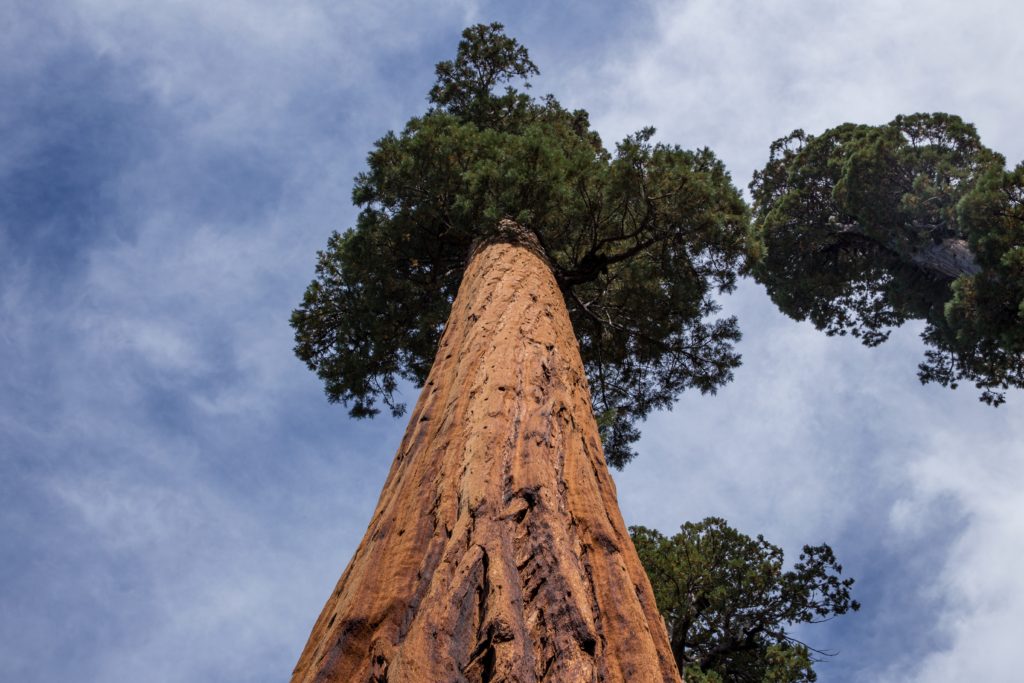Have you ever seen or been to the Redwood Forest of California?
Redwood trees are truly a natural phenomenon, and almost overwhelming in their size, presence and beauty. Reaching over 300 feet high, coast redwoods are the tallest living things in the world. Something of this size, naturally, needs a lot of energy to keep it alive. For redwoods, that energy is water. Each tree can require over 500 gallons of water every single day. That water is found and absorbed through the trees’ roots. You may think that a 300 foot-tall tree would require deep roots – but that’s not the case: Their roots are only about 5 feet deep, but they extend hundreds of feet away from the trunk, intertwining with other redwoods, fusing with other redwoods, and eventually reaching a water source such as a river. Because of their root systems, connected with so many others, redwoods are able to withstand high winds and raging floods. The tallest, strongest trees in the world aren’t the trees with the deepest roots – they are the ones with the most connected roots, and a reliable source of water. Much like these wonders of nature, our recovery is depends on a source of energy, and strong connection with others.
Connection in Addiction Recovery
No man is an island. As human beings, we do our best not when we are independent of one another – but rather when we are connected with companionship and community. We thrive when we live in a society where we offer our skills, services and talents – and others do the same. Each of us has something unique to contribute, and when we don’t participate and relate, there is a void. We need others, and others need us. This is especially true in addiction recovery. For many people, one of the biggest challenges after drug rehab is staying connected in addiction recovery. Getting the necessary help to enter recovery, staying sober and living a balanced live is a huge, ongoing undertaking: It involves tremendous work, dedication, focus, effort – and the courage to face personal struggles, traumas and emotion. While some days are more difficult than others, the days that challenge us can break us if we’re not prepared. You may have heard the quote from Johann Hari, “The opposite of addiction is not sobriety. The opposite of addiction is connection.” Isolation can foster addiction, as we try to fill the void that loneliness creates in our lives. When you are in recovery from addiction, the same holds true: Isolation can breed relapse. On the other hand, connection promotes health and happiness. Connection can grow us, and help us withstand the storms.
Planting Your Roots – And Growing Them
It is important to remember that in early recovery, many people feel that they are more isolated than ever. While in active addiction, we don’t truly have honest relationships we other people. We manipulate and use people to get the things we need. We often lose friendships and relationships before getting help, and repairing the damage can seem overwhelming in early recovery. It’s emotional; it’s uncomfortable; it’s awkward and frustrating. We’ve forgotten how to accept genuine kindness and friendship, because we’re used to it coming with ulterior motives. In early recovery, we’re also forced to ditch the “friends” who are still using and want us to come back. Planting your roots in early recovery starts with connecting with people – especially counselors, sponsors, therapists, friends and others who are also in recovery from addiction and alcoholism. These are the people who understand what it takes to maintain a balanced life and are a trustworthy, solid support system. These are the people who genuinely care about us and give our lives purpose.
Withstanding the High Winds and Raging Floods
At any stage of addiction recovery – especially the earliest days, there will be trials and trying situations that may make us think about drinking again and getting high. There will be days that you question whether recovery is worth it. There will be days you don’t want it anymore. These emotions are manifestations of the disease of addiction. Withstanding the difficult times can be made easier by communicating. Calling a good friend in recovery, a sponsor, a counselor or therapist means you’ll have a channel to express what’s going on in your life – rather than letting the thoughts bottle up in your head. Connecting with others, talking about what’s bothering you and why gives you strength in numbers. A friend in recovery or sponsor will understand these feelings, and most importantly, they’re not going to judge you for thinking about drinking or getting high. In fact, it’s just the opposite: These people want you to be well, and only want to prevent a relapse from happening. Time and time again, studies have shown that people who consider themselves happy and well tend to have close ties with other people. Maintaining relationships with others can mean making an effort to stay in touch with friends – or reaching out to others who may need a friend. When you make spending time with people a priority in your life, you feel healthier, happier and more balanced. Connecting with others and reaching to your source – the energy and your reason for wellness will help you to grow. You will have days – perhaps even weeks or months of high winds and raging floods. There will be days you don’t feel like standing tall. Those are the times that we need our connections and our support systems. Those are the times that will make the bad times easier, and the good times even better.


